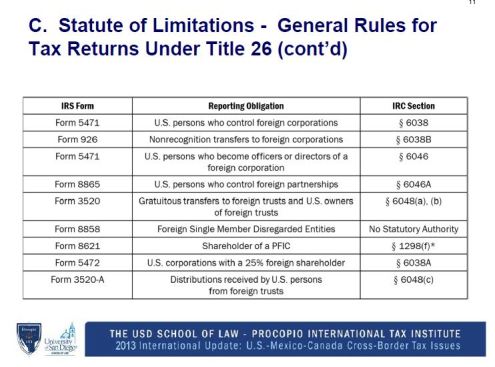When the U.S. Tax Law has no Statute of Limitations against the IRS; i.e., for the U.S. citizen and LPR residing outside the U.S.
There are basically three ways a U.S. citizen living outside the U.S. will have no protection of a statute of limitations vis–à–vis the IRS.
The statute of limitations is the time frame in which the government has to conduct an audit against a U.S. taxpayer. This is important, since once that time frame lapses (i.e., the statute of limitations period is over) the IRS cannot commence tax audits or assess taxes or tax penalties against the USC or LPR living overseas.
The three basic scenarios of when there is no statute of limitations for federal tax matters are as follows:
1. The USC or LPR does not file a U.S. income tax return. IRC Section 6501(c)(3).
2. There is fraud on the part of the taxpayer (e.g., the taxpayer intentionally does not report income). IRC Sections 6501(c)(1), (c)(2).
3. The USC or LPR fails to report certain foreign transactions. IRC Section 6501(c)(8). This rule was only recently adopted as part of the “HIRE Act” which also created FATCA. The following types of transactions and forms that give rise to an “open” statute of limitations period is set out below:
For an excellent overview of the statute of limitations periods, see the presentation – “Starting the Race Against the Tax Authority in the International Tax World – Statute of Limitations & Lack of Filings” by John C. McDougal, Special Trial Attorney – IRS, Jon P. Schimmer and Eric D. Swenson of Procopio.
One of the basic points to takeaway from the law, is that a USC or LPR is almost always better off by filing tax returns (complete and accurate), even when no tax is owing. This will help assure him or her of a fixed time frame during which the U.S. federal government can conduct tax audits and other related tax investigations.
请点击这里查看本帖子的中文版本。 (Please click here to view the above in Chinese.)

March 25, 2014 at 3:02 pm
[…] The failure to file an income tax return, means the time period against the IRS to audit the USC or LPR residing overseas will never lapse. See, When the U.S. Tax Law has no Statute of Limitations against the IRS; i.e., for the U.S. citizen and … […]
March 31, 2014 at 10:41 pm
[…] Legales Permanentes (RLP) que residen fuera de los Estados Unidos NUNCA expirará. Véase: Cuando la Ley Fiscal de los Estados Unidos NO tiene Plazo de Prescripción contra el IRS; ejemplo, para el Ciudadano Estadounidense (CEU) y los Residentes Legales Permanentes (RLP) que […]
May 2, 2014 at 5:41 am
[…] an audit against a USC residing overseas who has never filed U.S. income tax returns. See, When the U.S. Tax Law has no Statute of Limitations against the IRS; i.e., for the U.S. citizen and … (Posted on March 24, […]